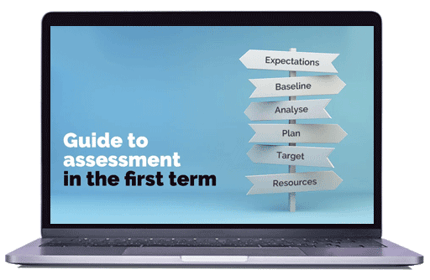CEM > School Assessments
Unlock your Students’ Potential with Cambridge CEM Baseline Assessments
At Cambridge CEM, we're here to give you the powerful insight you need to unlock your students' potential and improve the outcomes of all learners. Our baseline assessments give you a profile of each student's aptitudes and abilities and highlight their strengths and weaknesses.
Find out more about our baseline assessments and how they can help you to build on your understanding of your students' abilities and skills.

Find out more
Talk to an Expert
What is a baseline assessment?
Cambridge CEM's baseline assessments help you determine what your students, your class and your year group already know and can do, while supporting you in deciding the best next steps.
Using a baseline assessment helps you get to know your students quickly. It focuses on your students' starting point and enables you to measure each student's aptitude for learning and their potential.
Why is a good baseline assessment important?
A good baseline assessment can show you a student's starting point and give you and your students feedback. It helps you understand who is in the classroom, what they know and what skills they have yet to learn.
You can use the baseline assessment feedback to:
![]()
Ask the right questions.
![]()
Make good decisions.
![]()
Develop the best teaching and learning plans.
![]()
Strategically set goals and targets.
![]()
Drive student motivation and future teaching and learning.
FAQs
-
What's the purpose of a baseline assessment?
A baseline assessment is not a high-stakes test with a focus on the 'score' at the end of it.
Cambridge CEM's baseline assessments are formative assessments for learning. They help to identify how students are doing before and during their educational experience so that you can make the most of every student's potential.
A baseline assessment helps support both teaching and learning as it identifies students at risk of not being adequately supported. This can include students with learning difficulties who may require additional support as well as high-performing students who may need to be further challenged.
A baseline assessment is not intended to measure everything your students know or what they can do, but only a sample of their current knowledge and abilities.
Cambridge CEM uses a wealth of research evidence and psychometric theory to build an assessment that measures students' skills and aptitudes - the skills we know are critical for accessing the whole curriculum and, ultimately, for successful outcomes.
-
Why should schools measure students' abilities?
Measuring students' abilities is essential for ensuring that schools provide an adequate education for all their students. Measuring student ability helps schools:
- meet educational standards.
- support individual student needs.
- prepare students for future success.
It is a fundamental aspect of the educational process that benefits both students and the broader community.
-
What is the difference between formative and baseline assessments?
Formative assessments and baseline assessments are both types of assessments used in education, which provide valuable information about student learning, but they serve different purposes.
Baseline Assessments
Baseline assessments establish a starting point for a student's learning progress. They are typically administered at the beginning of a course or school year and can include an evaluation of the core skills needed to access the whole curriculum.
They are not assessing specific subject or curriculum knowledge but students' skills, abilities and academic potential. The focus of the baseline assessment may include reading assessments, mathematics assessments or writing assessments.
The purpose of baseline assessments is to determine a student's current level of skills and ability so that progress can be tracked over time and to help teachers to:
- understand what students already know and are capable of before they begin a new course or academic year
- identify students' strengths and weaknesses
- identify any gaps in learning
- determine which students may need additional support
- setting learning goals
- differentiate instruction to meet all student needs
- measure students' progress over time
At Cambridge CEM, we offer Early Years Assessments, Primary Assessments, Secondary Assessments and Post-16 Assessments, as well as Entrance Assessments and a Wellbeing Check.
Formative Assessments
Formative assessments gather ongoing feedback during the learning process throughout the year. The purpose of formative assessments is for teachers to identify students' strengths and weaknesses in content knowledge and to provide ongoing feedback that can be used to support student learning.
Formative assessments can be formal or informal and can include activities such as:
- quizzes
- classroom discussions
- in-class activities such as presentations
- homework exercises
-
How are Cambridge CEM assessments different from other baseline assessments?
Cambridge CEM's digital baseline assessments are delivered using adaptive algorithms to ensure students are presented with questions appropriate to their ability level.
Cambridge CEM's computer-adaptive test algorithm dynamically adjusts the difficulty, providing each student with questions tailored to their performance throughout the assessment.
When a student demonstrates strong performance and consistently answers questions correctly, the algorithm responds by offering increasingly challenging questions. Conversely, if a student needs help providing correct answers, the algorithm adapts by presenting slightly less challenging questions. The objective is to offer questions to which the student has an approximately 50% likelihood of responding accurately.
By using adaptive algorithms in all of Cambridge CEM assessments, they can help schools establish a baseline measure of ability in a way that is inclusive and can accommodate the full range of student abilities.
This makes the assessment:
- Personalised: Because of the adaptive algorithm, every student is met with questions that align with their ability level. This tailored approach ensures that no student feels overwhelmed by overly difficult questions or disengaged due to questions that are too easy. It's a highly personalised journey that caters to individual learning capabilities.
- More accurate: As students answer questions, the algorithm continuously fine-tunes the difficulty, resulting in a precise measure of their abilities. This accuracy is a valuable tool for educators and schools seeking to understand their students' strengths and areas for improvement.
- Quicker: The adaptive algorithm optimises the assessment process by efficiently zeroing in on a student's ability level. Since it adapts in real-time, there's no need for students to spend excessive time on questions that are too easy or too challenging.
- Student-friendly: Cambridge CEM's adaptive assessments are designed with students in mind. The tailored questions enhance the overall testing experience, making it more engaging and less stressful. Students are presented with challenges that are appropriate for them, fostering a positive and supportive testing environment.
- Fairer: By ensuring that questions are adjusted to offer a 50% likelihood of correct answers, the adaptive algorithm promotes fairness. It accommodates the full spectrum of student abilities, ensuring that no student is unfairly disadvantaged by questions that are too difficult or too easy. This approach underscores Cambridge CEM's commitment to equitable assessment practices.
-
When should I use a baseline assessment?
The best time to use baseline assessment is at the beginning of the school year, particularly at transitions between key educational phases where there's been a learning gap or school records might be patchy.
Because baseline assessment is usually conducted very early in the school year, it's an excellent way for teachers to get an overall picture of the skills and aptitudes of the students in their class. This can help them to understand the challenges ahead and where resources might need to be focused.
Insight from the assessment gives a profile of each student, highlighting the areas of strengths and weakness, which can support teachers in developing the best teaching and learning plans to get every student off to a flying start.
Using a baseline assessment at the beginning of the school year is also important to identify students at risk of needing to be adequately supported. This includes testing students who may need further evaluation to uncover learning difficulties and identifying highly able students who may need to be sufficiently challenged.
Use a Cambridge CEM baseline assessment:
- At the beginning of a period of study
- At transition points such as a change of curriculum, change of course, a new school, a new year
- After gaps in learning
- When other evidence is missing.
-
What is included in a baseline assessment?
The baseline assessment is curriculum-free and is not a test of subject knowledge; rather, it measures student ability in vital cognitive areas needed to access the whole curriculum.
Primary school students, aged between 5 and 11, are assessed in six key areas:
- Reading – word recognition, word decoding and comprehension
- Spelling – spelling rules, phonetics, vocabulary and writing skills
- Mathematics – counting, arithmetic, fractions, patterns, algebra, measures, shape and space, and data handling.
- Mental Arithmetic – addition, subtraction, multiplication and division
- Developed Ability – picture vocabulary and non-verbal reasoning.
Secondary school students, aged between 11 and 18, are assessed in three key cognitive areas, which research shows are linked to later academic outcomes.
- Vocabulary – word fluency, comprehension and understanding
- Mathematics – logical thinking, manipulating numbers and numerical concepts
- Non-verbal ability – recognising shapes, matching patterns, and applying spatial awareness and visual intuition.
For older students, their assessments will include complex vocabulary and calculations.
For Early Years children, baseline assessments measure the very early understanding of numeracy and literacy.
Cambridge CEM's baseline assessments also measure your students' developed ability: the current potential for learning or the student's capacity for learning. Developed ability is something they have developed over their lifetime and will continue to grow.
The assessments also offer predictions to GCSEs, IGCSEs, International Baccalaureate and A Levels exams.
Vocabulary: word fluency and understanding
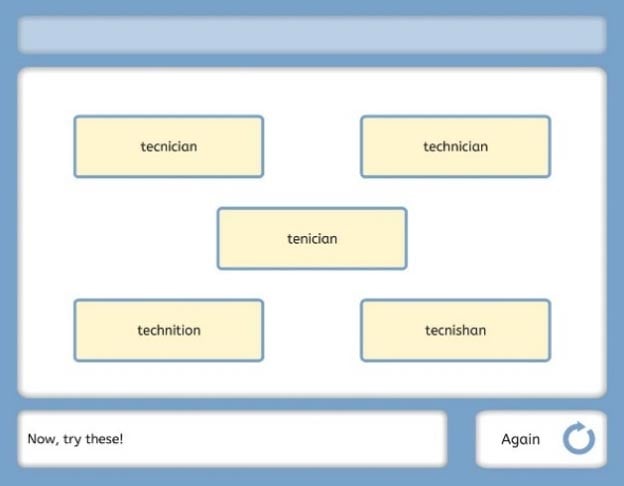
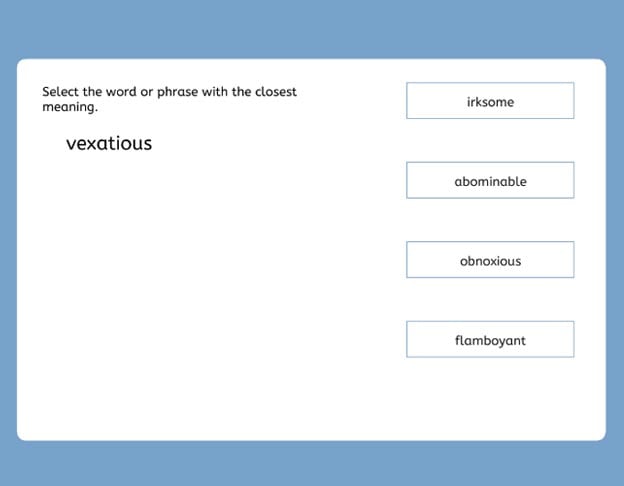
Maths: Mental arithmetic, logical thinking, manipulating numbers and numerical concepts
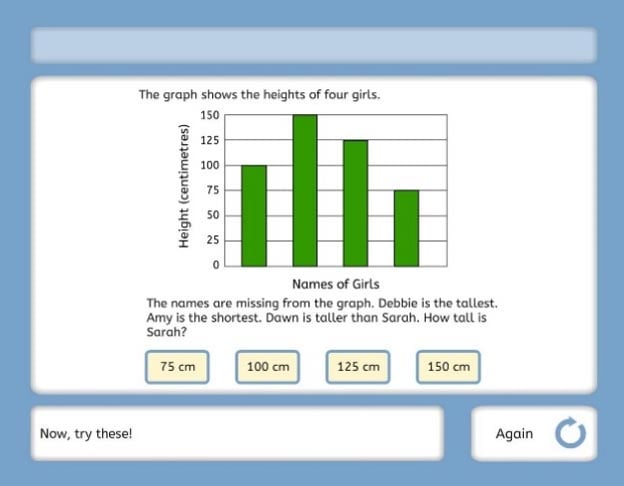
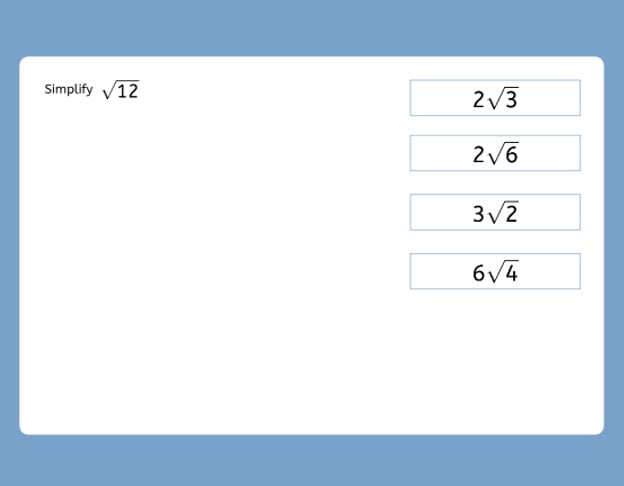
Non-verbal ability: recognising shapes, matching patterns, and applying spatial awareness and visual intuition
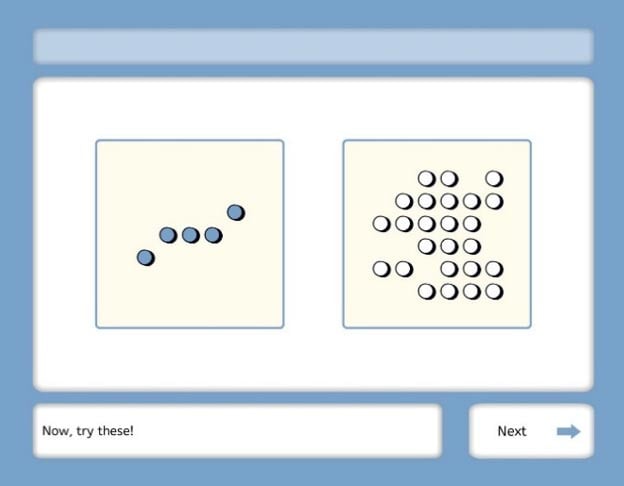
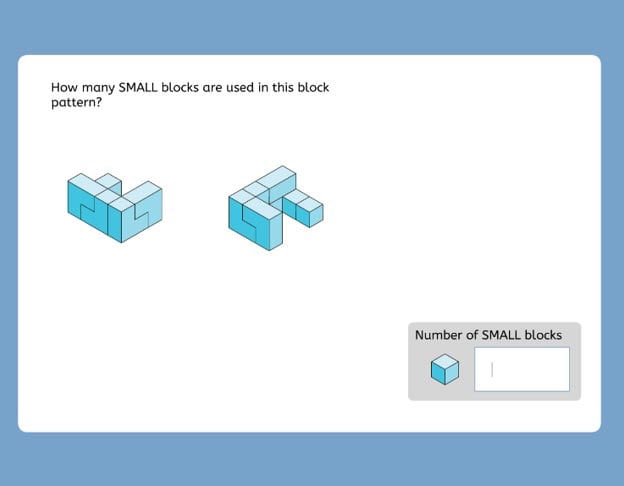
Which assessments are suitable for you?
Our CEM baseline assessments are based on extensive research and created to complement the stages of child development. There is a CEM baseline assessment for every education phase.
We also provide the Cambridge Wellbeing Check, a student-led assessment for students aged 7-18 that helps you understand how your students feel and where they need support.
See what teachers are saying about CEM baseline assessments
Whether you belong to a state, independent or international school, our assessments help thousands of teachers in empowering their students to realise their true potential.
“We use CEM because it gives so much information about the students that supports both teachers and leadership. … CEM assessments are an ideal tool – we use them for lots of different purposes”
“We use CEM assessments because they help us to make judgements that will inform teaching and learning, and give us objective data that will help us to improve the education that our students receive.”
“It has been a vital tool with so many benefits, from setting standards and raising expectations, to helping us support students and staff, to measuring school performance”
Why use a baseline assessment?

Assess
- Adaptive, personalised and tailored assessment
- Formative and diagnostic feedback to inform learning
- Used with groups of students or with individuals
- Information at student, class, subject, school level

Analyse
- An objective measure of students' strengths and weaknesses
- Identify what students can and cannot do before you teach them
- diagnose learning gaps
- indicators to grades at GCSE, IGCSE, A Level and IB Diploma
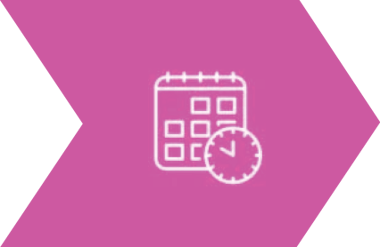
Plan
- Set students up for success
- Raise expectations
- Set realistic and challenging targets
- Plan early interventions

Teach
- Data supports professional judgement
- Helps target resources effectively
- Shape your teaching to meet your students' learning needs
- Track progress

Reflect
- Examine student outcomes
- Monitor school performance over time
- Measure the impact of your teaching
- Share best practice
About Cambridge CEM:
We’re a not-for-profit organisation on a mission to unlock every student’s potential with the very best learning and research solutions. We’re part of Cambridge University Press & Assessment, and we’ve been helping teachers clearly see what’s happening in the classroom for 40 years, empowering millions of students in over 120 countries to achieve ever-greater things.
Find out more:
Blogs
Videos

What is a baseline assessment? Video with Kate Bailey (3 mins, 21 secs)

What are the benefits of using a baseline assessment Testimonial video from Cedar School, Pakistan (1 min, 29 secs)

Benefits of using baseline assessments Testimonial video from The English College in Prague (2 mins, 35 secs)




